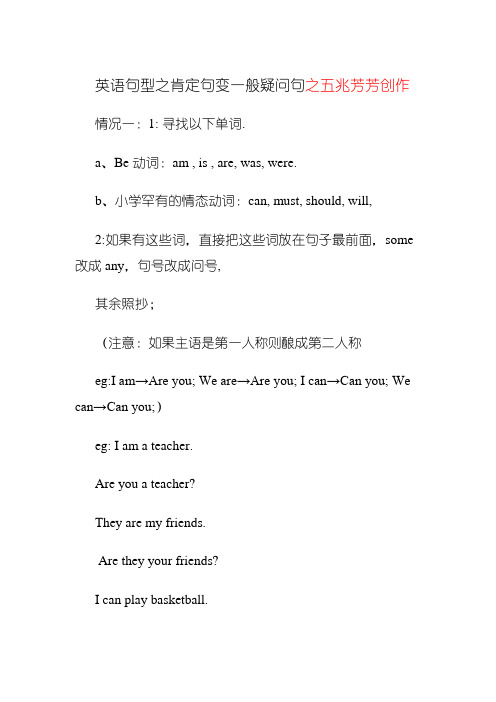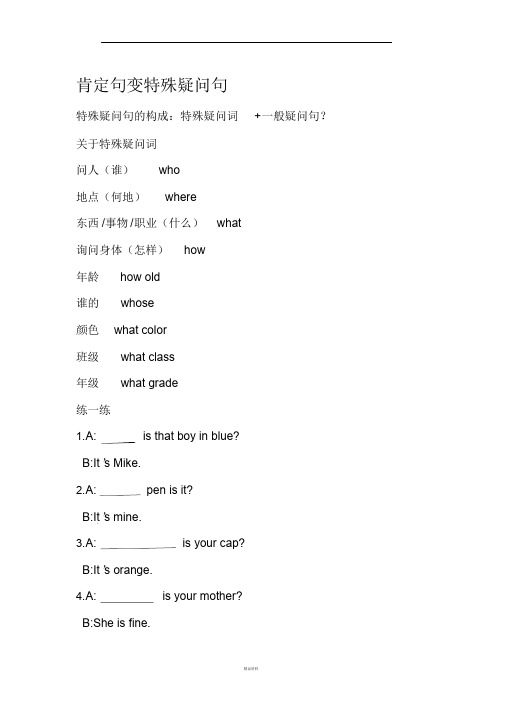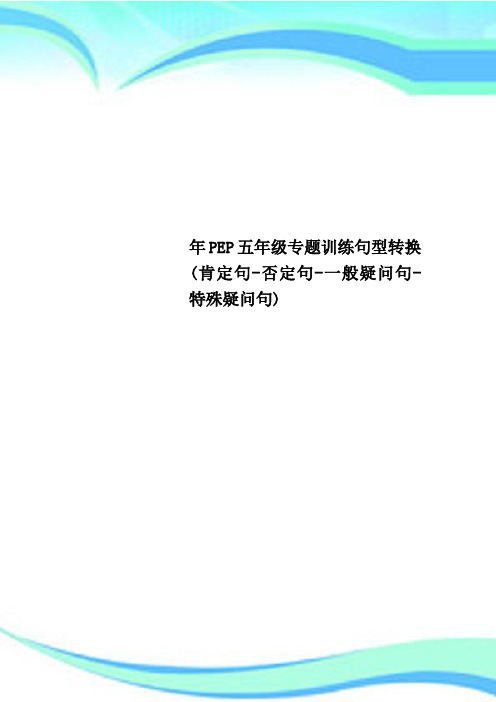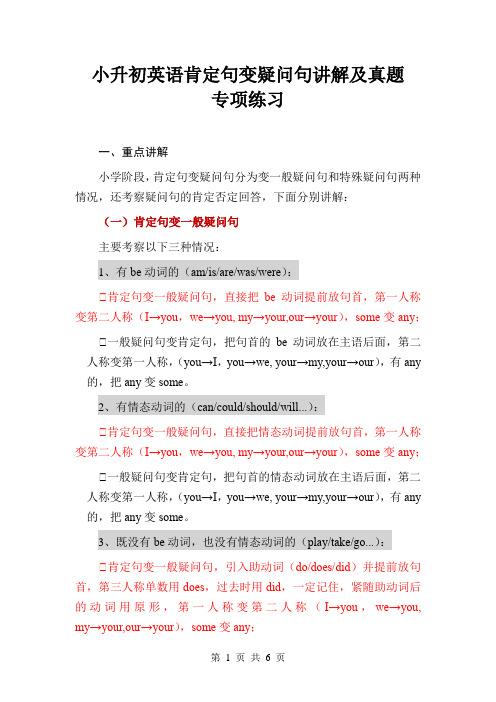肯定句变疑问句练习题
肯定句变一般疑问句的规则练习

变为否定句
1. I am Maria’s friend. I _____ am ______ not Maria’s friend. 2. He was reading a novel in the study. wasn He ________ _________ reading a novel in the study. ’t 3. Steve was doing some cleaning at this time yesterday. any cleaning at this time yesterday. ’doing ______ Steve wasn ______ 4. He minds it. t He doesn _______ ______ mind it. 5. Be ’ quick. t ______ ______ quick. Don be 6. ’ Michael can speak some French.. t Michael ______ can speak ______ any French. *7. I used to walk ’ t to school before. I _________ ______ usedn to walk to school before.
对划线部分提问
1. I’m feeling very well today. How ______ are ______ you feeling today? 2. Jim took the pills twice a day. did Jim take the pills ? often How ______ _____ 3. The boy was walking down the street when the UFO landed. Wห้องสมุดไป่ตู้at doing ______ was the boy _______ when the UFO landed? 4. I used to listen to pop music . What _______ used ______ you to do? 5. Ann spends at least an hour in the gym every day. How ______ long _____ does Ann spend in the gym every day? 6. I watched a soccer game on TV last night. When ______ did ______ you watch a soccer game on TV? 7. I was born in Chengdu. Where ______ were you born? _______
肯定句变疑问句练习题之欧阳育创编

把下列句子变成一般疑问句和否定句1.2.I am listening to music._______________________________ _____________________________2 Tom likes listening to music_____________________________ _____________________________3.Sarah can clean the classroom._____________________________________________________________ 4. We play basketball on Sundays.____________________________________________________________5. I go to see my parents once a month._______________________________ _______________________________ 6、I am a teacher._______________________________ _______________________________ 7、You are a student._______________________________ _______________________________ 8、Danny likes green._______________________________ _______________________________ 9、She works in a store.________________________________ _____________________________ 10、I want to have some apples.____________________________ ____________________________11、I have some books._____________________________ ______________________________ 12、Jim can play basketball._____________________________ ____________________________13.The children have a good time in the park._______________________________ ________________________________ 14.There is only one problem. ___________________________________________________________15.Ann doesher homework every evening._______________________________ ________________________________ 16.I read an English book every day.________________________________ ________________________________ 17.My brother is in the park now.________________________________ ________________________________18.She has some bread for lunch today.__________________________________________________________________19.They read English every day. ________________________________ _______________________________21.I get up at six thirty every day.________________________________ ________________________________ 22.Jim is good at English and Maths.__________________________________________________________________23. He is thirty kilos.________________________________ ________________________________ 24. The computer is very nice.________________________________ ________________________________ 25. I get to the shopping centre by bus.________________________________ ________________________________ 26. I like autumn best.________________________________ ________________________________27. Su Yang is asking Ben some questions._______________________________ ________________________________ 28. I know his telephone number.__________________________________________________________________29. It is a fine day today.______________________________________________________________ 30. I like collecting stamps and singing.________________________________ _________________________________ 31. He often cleans his bedroom.________________________________ _________________________________小学英语对划线部分提问练习题“就划线部分提问”是小学阶段英语学习的难点,但是一旦掌握了规律,就变得容易多了。
(完整版)肯定句变特殊疑问句练习和语法.doc

特殊疑问句肯定句变特殊疑问句(就划线部分提问):分 3 步骤第一步:先变一般疑问句第二步:找合适的特殊疑问词代替划线部分第三步:特殊疑问词提前放到句首,并大写,其余按顺序照抄,省略划线部分。
注意: 1.一定先变一般疑问句。
但是,如果问的是主语或主语的定语时,语序不变,为" 特殊疑问词 (+主语 )+陈述句 "。
2.划线部分不能在特殊疑问句中出现。
非单三时用do, 单三时用does非单三肯定句:I like English.一般疑问句:Do you like English?否定句: I do not like English.单三肯定句: He likes English.一般疑问句:Does he like English?否定句: He does not like English.就划线部分提问:I like English.第一步:先变一般疑问句Do you like English?第二步:找合适的特殊疑问词代替划线部分Do you like what?第三步:特殊疑问词提前放到句首,并大写,其余按顺序照抄,省略划线部分。
What do you like?小学英语对划线部分提问答题口诀:一代(用疑问词代替划线部分),二移(把疑问词移至句首),三找(找 is , are ,can,would)抄在疑问词后,没有则用do,does( 用于主语是第三人称 ) ,出现 I am 则直接改为 Are you ),四抄(照抄其它部分)五改(出现 some,要考虑是否改为 any。
出现 I改为you,出现we改为you ,出现 my 改为 your, 出现 our 改为 your 。
最后是加问号)特殊疑问句有两种语序:(可以不掌握 )(1)如疑问词作主语或主语的定语,即对主语或主语的定语提问,其语序是陈述句的语序:疑问词(+主语)+谓语动词+其他成分例: who is singing in the room﹖whose bike is broken﹖(2)如疑问词作其他成分,即对其他成分提问,其语序是:疑问词+一般疑问句语序?例: what class are you in﹖特殊:1.some 变为 any。
肯定句变一般疑问句

英语句型之肯定句变一般疑问句之五兆芳芳创作情况一:1: 寻找以下单词.a、Be 动词:am , is , are, was, were.b、小学罕有的情态动词:can, must, should, will,2:如果有这些词,直接把这些词放在句子最前面,some 改成any,句号改成问号,其余照抄;(注意:如果主语是第一人称则酿成第二人称eg:I am→Are you; We are→Are you; I can→Can you; We can→Can you;)eg: I am a teacher.Are you a teacher?They are my friends.Are they your friends?I can play basketball.Can you play basketball?My sister is watching TV.Is your sister watching TV?情况二:情况一中单词找不到的句子,在句子前面加助动词do, does,(如何确定助动词用do, does,呢?按照句中动词,动词是原形的就用do, 动词是单三形式的就用does)注意:变疑问句时,句中有some,要将some变成any;句中动词用原形.(如果主语是第一人称则酿成第二人称)eg: I like the monkeys.Do you like the monkeys?My sister has a lovely dog.Does your sister have a lovely dog?I have some bread and milk every morning.Do you have any bread and milk every morning?。
小学英语语法肯定句变一般疑问句、特殊疑问句的练习题

肯定句变疑问句-能力测试一、将下列问句做出简单回答。
1.Is he tall?2.Is she at home?Yes,____________.No,_____________.Yes,____________.No,_____________.3.Are you busy these days?4.Can you make the bed at home?Yes,____________.No,_____________.Yes,____________.No,_____________.5.Did Lucy go to the zoo yesterday?6.Was your father a teacher?Yes,____________.No,_____________.Yes,____________.No,_____________.7.Were you at the meeting last week?8.Will she have a meeting tomorrow?Yes,____________.No,_____________.Yes,____________.No,_____________.9.Do you do your homework?10.Does she water the flowers?Yes,____________.No,_____________.Yes,____________.No,_____________.二、将下列句子改成一般疑问句。
1.My brother often goes shopping._________________________________________________________________2.I finished school two years ago._________________________________________________________________3.They go to Beijing by plane._________________________________________________________________4.He has a brother and a sister._________________________________________________________________5.It is an apple._________________________________________________________________6.There is some water in the bottle._________________________________________________________________7.I visited my aunt last holiday._________________________________________________________________8.My sister studied hard last night._________________________________________________________________9.There is some milk in the cup._________________________________________________________________10.I know his telephone number._________________________________________________________________11.I get up at six thirty every day._________________________________________________________________12.They can play football after school._________________________________________________________________13.I’m a student._________________________________________________________________三、对下列句子的划线部分提问。
一般疑问句讲解及练习题

变一般疑问句(一)二、肯定句改一般疑问句的方法——三步法1、含be动词或情态动词的句子秘诀:一调二改三问号一调:即把句中的be或情态动词调到主语前;二改:改换主语称谓,即将句中的主语I\my \mines\we\our\ours等第一人称分别改为相应的第二人称you\your\ yours等;三问号:句末的句号改为问号。
Eg:6. I am an English teacher.→ Are you an English teacher?Eg:7. We can speak English fluently.→Can you speak English fluently?做题步骤:(句子中是be动词,即是am, is, are)1、把be动词(am, is, are)或情态动词放在句首,剩下的照抄。
2、人称变化:一变二、二变一、三不变。
(第一人称变成第二人称、第二人称变成第一人称、第三人称不变化。
)I You my your we you3、some 改成any4、句点改成问号。
把下列句子变成一般疑问句1.I am listening to music.2.Mike is a student.3.They are in the zoo.4.There are some flowers in the vase.5.This is my sister.6.We are sweeping the floor.7.There is an ostrich in the zoo.8.It is a beautiful park.9.It is a big map.10. You are a singer.练习:将下列句子改成一般疑问句1.It is a lovely dog.2.She is lovely girl.3.He is my father.4.They are Lily’s cousins.5.We are classmates.6.I am a doctor.7.There is a bird in the tree.8.There are many stars in the sky.9.They are good friends.10.There are many books on the shelf.变一般疑问句(二)2、含行为动词(或称为实义动词)的句子秘诀:一加二改三问号一加:即在句首加助动词Do或Does;二改:1、把谓语动词改为原形;2.改换主语称谓三问号:句末的句号改为问号。
肯定句变成一般疑问句的方法

肯定句变成一般疑问句的方法第一步:看所给句子的谓语动词是否为Be动词,是Be动词的,把Be动词移放在句首,剩下的照抄,同时将句子中的some 改成any. I 改成you, my改成your, 句点改成问号。
如:I am a teacher. →Are you a teacher?She is a student. → Is she a student.第二步,看所给句子的谓语动词是否为情态动词,是情态动词的,把情态动词can,shall, will等移放到句首,剩下的照抄,同时将句子中的some 改成any.I 改成you, my改成your, 句点改成问号。
如:I can play basketball. → Can you play basketball?第三步,如果所给句子的谓语动词既不是Be动词也不是情态动词,在句首请助动词Do/Does/Did帮忙,剩下的照抄,同时将句子中的some 改成any. I 改成you, my改成your, 句点改成问号。
如:I play computer games everyday. →Do you play computer games everyday? He plays computer games everyday. →Does he play computer games everyday? We played computer games yesterday . →Did you play computer games yesterday?一般疑问句的回答一般疑问句有两种回答,即:肯定回答和否定回答。
肯定回答用yes, 语句顺序为:Yes ,主语 + am /is/ are/was/were.|can.|do/does/did|;否定回答用no,语句顺序为:No,主语+ am not/ isn’t/ aren’t/wasn't/weren't.|can't.|don't/doesn't/didn't|.。
一般疑问句改法及练习题

宋楼完小一般疑问句改法1.把肯定句改为疑问句就是有be(is , am, are)或者情态动词(can...)的就把be(is , am, are)或者情态动词(can...)提到句首来.2.没有be(is , am, are)或者情态动词(can...)的就在句首加do或does (用于主语是第三人称单数时)例:I am ten.-----Are you ten?I get up at six o’clock(6点).---- Do you get up at six o’clock?一般疑问句的回答一般疑问句的回答分为肯定回答与否定回答两种。
1、肯定回答:Yes , 主语+ 一般疑问句开头的那个单词。
例如:Is Tom a student?Yes , he is .2、否定回答:No , 主语+ 一般疑问句开头那个单词与not的缩写形式。
例如:Is Tom a student?No , he isn`t.注意: 如果主语是男性,就用he,女性就用she.问句的主语是you时,回答是用I或we.否定句改法:1.有be(is , am, are)或者情态动词(can...)的就be或者情态动词(can...)后面+not2.没有Be的就在主语的后面+do not或does not(用于主语是第三人称单数时)例: I am a teacher. ----I am not a teacher.She likes singing.------She does not like singing.如何区分英语中的人称英语中的人称可以分为:第一人称、第二人称、第三人称。
第一人称指的是:我(I)我们(we)第二人称指的是:你(you)你们(you)第三人称指的是:他(he)、她(she)、它(it),(他、她、它)们(they),或者名字,比如:Amy。
或者XX的妈妈、XX的......注意:如果指的是一个人,或者指一个物品都属于第三人称单数。
肯定句变一般疑问句练习

肯定句变一般疑问句练习一、有be动词的1.The students are playing soccer on the playground. _____ the students _____ soccer on the playground2、They were born in a town in Beijing. _____ they _____ in a town in Beijing3、I was born in 1994. ____ ____ born in 19944.They are doing some shopping. They _______ _______ some shopping next weekend.5. Im going to got good grades in the final exam. you to get good grades in the final exam二、含有情态动词的1、Id like a cup of tea. _______ you ________ a cup of tea2、I would like to go to the zoo with you. ____ ____ ____ to go to the zoo with ____3、The snow will stop later in the day. ____ the snow ____later in the day4. I’d like to have some coffee. ________ ________ like to have________ coffee 5.I’d like to have fish and vegetabl es for lunch.____________ you ___________ to have fish and vegetables for lunch 三只有实义动词的1.Maria often takes the subway home. _____ Maria often _____ the subway home 2、Michael goes to school by car. Michael to school by car3、I have some interesting books. ________ you have ________ interesting books4、Lucy recited a Chinese poem at her birthday party. _____ Lucy _____ a Chinese poem at her birthday party5、 I want to be an actor. _________ you ________ to be an actor6、We had a good weekend. ________ ________ _______ a good weekend7、I have to write some letters. ________ you have to ______ _________letters 8、Sue has breakfast at 7 in the morning. ________ Sue _______ breakfast at 7 in the morning 9、They visited the Great Wall last year. ____they____the Great Wall last year 10、They had a good time last Sunday. ____They____ a good time last Sunday 11、Ann felt very happy.____ Ann ____very happy12.Bai Jie likes history very much.___________________________________ 13. He eats breakfast at 7:00._______ he _______ breakfast at 7:00 14.They have to get up early every day. _______they _______ _______ get up early every day 15.The boys used to go fishing by the river. _______ the boys _______ to go fishing by the river 16. Mr Green stays in Shanghai for three days. _______ Mr. Green _______ in Shanghai for three days17.The boys used to go fishing by the river. _______ the boys_______ to go fishing by the river 18. He played tennis last Sunday .__________ he _________tennis last Sunday 19.I had a fever last night_____ you_____ a fever last night 20.Michael has to take care of his little sister. ______ Michael ______ _______ take care of his little sister21、I used to go swimming during the summer vacation. __________ you __________ to go swimming during the summer vacation.22、Our school held a sports meet last week. ____________ yourschool ___________ a sports meet last week四 there be句型1、There are some bikes in the room. ________ ________ ________bikes in the room 2、There are a lot of festivals in China. ____ ___ a lot of festivals in China 五、特殊类1、He did his homework before class. _________ he _________ his homework before class2、Tom does his homework every day. ____Tom____ his homework every day3、She did her homework last night. ____ she ____ her homework last night 4. Tom does his homework every night. ________ Tom ________ his homework every night 5. He does his homework in the evening. ___________ he ____________ his homework in the evening6. Mary did her homework last night. ______ Mary ______ her homework last night 加强记忆口诀:“肯变一,并不难,can 或be提在前;谓语若为行为动,do 或does句首用肯定句改否定句的方法——一步法1、在be动词后加not。
小学英语语法专项肯定句变一般疑问句

一般疑问句: Does she have any bread for lunch today?
肯定回答: Yes, she does.
否定回答:
No, she doesn’t.
Thanks for watching!
小学英语语法专项 肯定句变一般疑句
中文解释什么是一般疑问句
是的,我是。
不,我不是。
你是一名小学生吗?
中文解释什么是一般疑问句
是的,她喜欢。
不,她不喜欢。
她喜欢唱歌吗?
英语中的一般疑问句
一.什么是一般疑问句?
一般疑问句是疑问句的一种。它是一般只用
yes(是)或 no(否)来回答的
句子 。
英语中的一般疑问句
肯定回答:__Y_e_s___, _t_h_e_r_e__a_r_e_. 否定回答:__N_o____, _t_h_e_r_e__a_r_e_n’t.
6. There is some bread on the table.
___Is___ there __a_n_y__ on the table?
肯定回答:___Y_e_s__, _t_h_e_r_e_i_s_.__ 否定回答:___N__o__, _th__e_re__i_s_n_’_t.
_A__r_e_ they _w_a_t_c_h_in_g_ TV now?
肯定回答:__Y_e_s___, __th__e_y_a_r_e_.___ 否定回答:__N_o____, __th__e_y__a_r_e_n_’_t.
例句:
5. There are some books.
_A__re__ there ___a_n_y_ books?
英语中的一般疑问句
肯定句变特殊疑问句

肯定句变特殊疑问句特殊疑问句的构成:特殊疑问词+一般疑问句?关于特殊疑问词问人(谁)who地点(何地)where东西/事物/职业(什么)what询问身体(怎样)how年龄how old谁的whose颜色what color班级what class年级what grade练一练1. A: is that boy in blue?B:It ’s Mike.2. A: pen is it?B:It ’s mine.3. A: is your cap?B:It ’s orange.4. A: is your mother?B:She is fine.5. A: is your cousin?B:He ’s 15 years old.6.A :are these?B:They are books.7. S he is in Class Seven,Grade Eight. (对划线部分提问)8. T hat is an egg. (对划线部分提问)9. M y favorite colors are blue and white.( 对划线部分提问)10. S tephen Hawking is from England. (对划线部分提问)11. H e is Wang Yueyue. (对划线部分提问)12. M y name is Sally. (对划线部分提问)13. S he is in Grade 7. (对划线部分提问)14. T his cap is Kangkang ’s.(对划线部分提问)15. T hose coats are purple. (对划线部分提问)16. T hese bananas are theirs. (对划线部分提问)17.My brother is thirteen. (对划线部分提问)18.Eason is my favorite singer. (对划线部分提问)19.My mother is OK. (对划线部分提问)20.We are in Class One, Grade Seven. (对划线部分提问)Welcome To Download !!!欢迎您的下载,资料仅供参考!。
PEP五年级专题训练句型转换(肯定句-否定句-一般疑问句-特殊疑问句)

年PEP五年级专题训练句型转换(肯定句-否定句-一般疑问句-特殊疑问句)————————————————————————————————作者:————————————————————————————————日期:2013年PEP五年级下专题训练—句型转换一、肯定句、否定句、一般疑问句和特殊疑问句定义1.肯定句:表示肯定的意思, 即不含有否定词“不”。
比如:我是一个学生 I am a student.他去上学 He goes to school.2.否定句:表示否定的意思。
比如:我不是一个男孩。
I am not a boy他不去上学 He does not go to school.3. 一般疑问句:回答为“是yes”或者“否no”的问句。
比如:你是一个学生吗? Are you a student?你喜欢英语吗? Do you like English?4. 特殊疑问句:回答不是“是yes”或者“否no”的问句,根据提问内容具体回答。
比如:现在几点了? What’s the time?哪一支笔是你的? Which is your pen?二、句型变化规则:A.肯定句变否定句1、在be动词后加not。
如:is not , are not , am not, was not, were not;eg: I am a teacher. → I am not a teacher.2、在can,等后加not。
如:cannoteg:Li Lei can swim. → Li Lei can not ( can't ) swim.1. I am listening to music.2. Mike is a student.3. Sarah can clean the classroom.4. They are in the zoo.5. There are some flowers in the vase.6.This is my sister.7.We are sweeping the floor.3、上述都没有的,在动词前加助动词否定形式do not, does not. (don’t/doesn’t)eg:Mr Wang works in a factory. → Mr Wang doesn't work in a factory.1. We need some masks.2. They like making the puppet.3. Su Hai and Su Yang live in a new house.4.I put a book on my head.5. They sing “In the classroom”together.6.We play basketball on Sundays.7. Tom likes listening to musicB.肯定句变一般疑问句如何将一个肯定的陈述句改为一般疑问句:1、把be动词放在句首,剩下的照抄,(some 改成any,my改成your等)句点改成问号。
小升初英语肯定句变疑问句讲解及真题专项练习

小升初英语肯定句变疑问句讲解及真题专项练习一、重点讲解小学阶段,肯定句变疑问句分为变一般疑问句和特殊疑问句两种情况,还考察疑问句的肯定否定回答,下面分别讲解:(一)肯定句变一般疑问句主要考察以下三种情况:1、有be动词的(am/is/are/was/were):①肯定句变一般疑问句,直接把be动词提前放句首,第一人称变第二人称(I→you,we→you, my→your,our→your),some变any;①一般疑问句变肯定句,把句首的be动词放在主语后面,第二人称变第一人称,(you→I,you→we, your→my,your→our),有any 的,把any变some。
2、有情态动词的(can/could/should/will...):①肯定句变一般疑问句,直接把情态动词提前放句首,第一人称变第二人称(I→you,we→you, my→your,our→your),some变any;①一般疑问句变肯定句,把句首的情态动词放在主语后面,第二人称变第一人称,(you→I,you→we, your→my,your→our),有any 的,把any变some。
3、既没有be动词,也没有情态动词的(play/take/go...):①肯定句变一般疑问句,引入助动词(do/does/did)并提前放句首,第三人称单数用does,过去时用did,一定记住,紧随助动词后的动词用原形,第一人称变第二人称(I→you,we→you, my→your,our→your),some变any;①一般疑问句变肯定句,把do/does/did去掉,人称变回来,any 变some,同时注意主语是否是第三人称单数以及时态,运用适当的动词形式。
(二)肯定句变特殊疑问句此类题型考察较多,做题时应遵循如下技巧:1、观察划线部分内容,选取对应的特殊疑问词。
比如,划线部分是地点用where,时间用when/what time,人用who,形容词用how 等等不再一一赘述。
- 1、下载文档前请自行甄别文档内容的完整性,平台不提供额外的编辑、内容补充、找答案等附加服务。
- 2、"仅部分预览"的文档,不可在线预览部分如存在完整性等问题,可反馈申请退款(可完整预览的文档不适用该条件!)。
- 3、如文档侵犯您的权益,请联系客服反馈,我们会尽快为您处理(人工客服工作时间:9:00-18:30)。
把下列句子变成一般疑问句和否定句1.I am listening to music._______________________________ _____________________________2 Tom likes listening to music_____________________________ _____________________________3.Sarah can clean the classroom.________________________________ _____________________________ 4. We play basketball on Sundays.________________________________ ____________________________ 5. I go to see my parents once a month._______________________________ _______________________________ 6、I am a teacher._______________________________ _______________________________ 7、You are a student._______________________________ _______________________________ 8、Danny likes green._______________________________ _______________________________ 9、She works in a store.________________________________ _____________________________ 10、I want to have some apples.____________________________ ____________________________11、I have some books._____________________________ ______________________________ 12、Jim can play basketball._____________________________ ____________________________ 13.The children have a good time in the park._______________________________ ________________________________ 14.There is only one problem.____________________________ _______________________________15.Ann does her homework every evening._______________________________ ________________________________ 16.I read an English book every day.________________________________ ________________________________ 17.My brother is in the park now.________________________________ ________________________________ 18.She has some bread for lunch today._________________________________ _________________________________ 19.They read English every day.________________________________ _______________________________ 21.I get up at six thirty every day.________________________________ ________________________________ 22.Jim is good at English and Maths._________________________________ _________________________________ 23. He is thirty kilos.________________________________ ________________________________ 24. The computer is very nice.________________________________ ________________________________ 25. I get to the shopping centre by bus.________________________________ ________________________________ 26. I like autumn best.________________________________ ________________________________ 27. Su Yang is asking Ben some questions._______________________________ ________________________________28. I know his telephone number._________________________________ _________________________________ 29. It is a fine day today.___________________________________ ___________________________30. I like collecting stamps and singing.________________________________ _________________________________ 31. He often cleans his bedroom.________________________________ _________________________________小学英语对划线部分提问练习题“就划线部分提问”是小学阶段英语学习的难点,但是一旦掌握了规律,就变得容易多了。
小学英语对划线部分提问之答题口诀:一代(用正确的疑问词代替划线部分),二移(把疑问词移至句首)三倒(颠倒主谓语,但对主语或其定语提问时除外)四抄(照抄句子剩余部分)★总结关键就是:“特殊疑问词+一般疑问句”(即:先根据划线部分找到特殊疑问词;再把没划线的部分变成一般疑问句的语序。
)★特殊疑问词的确定要根据划线内容而定,在小学阶段常出现的有以下几种:1、划线部分是“事或物”,特殊疑问词用what如: This is a book. ---What is this?I often play football on Saturdays .---What do you often do on Saturdays ?2、划线部分是“人”,特殊疑问词用who如:He is my brother. ---Who is he ?划线部分是“地点”,特殊疑问词用where如:The box is on the desk. ---Where is the box ?4、划线部分是“时间”,特殊疑问词用what time或when如:It's seven twenty. ---What time is it ?I usually get up at six .When do you usually get up?5、划线部分是“年龄”,特殊疑问词用how old如:I am twelve . -How old are you?My father is thirty-three. -How old is your father ?6、划线部分是“职业”,特殊疑问词用what如:Mike is a worker. ---What is Mike ?7、划线部分是“颜色”,特殊疑问词用what colour如: My hat is blue . ---What colour is your hat?8、划线部分是“数量”,特殊疑问词用how many或how much 如:I can see five kites.--How many kites can you see ?There is some milk in the glass.How much milk is there in the glass ?9、划线部分是“多少钱”,特殊疑问词用how much如:This pen is nine yuan . ---How much is this pen ?10、划线部分是“形容词性物主代词或名词性物主代词”,特殊疑问词用whose 如:That is my book . ---Whose book is that ?The bag is yours. ---Whose is the bag ?以下口诀要牢记:1.问“谁”用who; 2.问“谁的”,用whose;3.问“地点哪里”,用where; 4.问“原因”,用why;5.问“身体状况”,用how; 6.问“方式”,用how;7.问“年龄”,用how old; 8.问“多少”,用how many;9.问"价钱”用how much; 10.问“哪一个”,用which ;11.问“什么”,用what; 12.问“职业”,用what;13.问“颜色”,用what colour;14.问“星期”,用what day;15.问什么学科,用what subject;16.问“什么时候”,用when;17.问几点用What’s the time?或 What time is it?1. That car is yellow. (提示:问颜色) _____ _____ is that car?2. My sister is 15 years old. (提示:问年龄)______ _____ is your sister?3. The glasses are Jim’s. (提示:问归属) ______ glasses arethese?4. Ann collected shells last Sunday.(提示:问”谁”)______ collected shells last Sunday?5. There were eleven books in my bag.(提示: 问数量)______ ______ books are there in your bag?6. I visited my teachers on Teacher’s Day.(提示:问时间)_______ did you visit your teachers?7. It means “Do not touch”.(提示:问”什么”) _______ does itmean?8. I’m fine, thank you.(提示: 问怎么样) ______ are you?9. I go to school by bus.(提示:问方式)______ do you go to school?11. I’m in Class 3. ______ _______ are you in?12. The panda is black and white. _____ ______ is the panda?13. Her kite is under the bed. _____ ______ her kite?14. I come to school by bike. _____ _____ you come to school?16. Mother bought a gift for me._____ did mother buy a gift for?17. I can hear a bus._____ can you hear?18. Tony lives at 26 Lunwan Street._____ does Tony live?19. Bob is wearing a blue hat._____ is wearing a blue hat?20. This is Ben’s English book._____ English book is this?。
